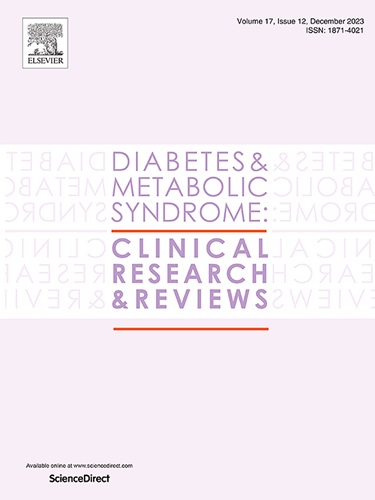Effects of deep ocean-derived magnesium-enhanced water on metabolic diseases with microbiome changes
IF 3.4
Q1 ENDOCRINOLOGY & METABOLISM
Diabetes & Metabolic Syndrome-Clinical Research & Reviews
Pub Date : 2025-02-01
DOI:10.1016/j.dsx.2025.103203
引用次数: 0
Abstract
Aims
To investigate the effects of magnesium (Mg) from deep ocean sources, we conducted a randomized clinical trial involving adults with hypertension, diabetes, or hyperlipidemia.
Methods
Subjects consumed either Mg-enriched water (MEW) or a placebo (80 or 6 mg of Mg per 2 L/day, respectively) for 4 weeks. We examined the detoxifying effects of MEW on environmental toxicants, including polycyclic aromatic hydrocarbons (PAHs) and oxidative stress, and its impact on gut microbiome composition (N = 30; 49.26 ± 9.55 yrs).
Results
Most subjects consumed less Mg than the RDA, enabling their participation in the trial. Despite limitations in serum Mg measurement to assess Mg intake, MEW intake led to improvements in body mass index (BMI), insulin levels, triglycerides, glucose-BMI, and fatigue. Regardless of Mg content, water consumption reduced urinary levels of 1-hydroxypyrene, a major PAH metabolite, and malondialdehyde, an oxidative stress biomarker. Moreover, the MEW group exhibited greater diversity in gut microbiome composition than the placebo group. Notably, MEW kept the abundance of Clostridium, Dorea, or Desulfovibrio, indicating a balanced Mg intake.
Conclusion
MEW (80 mg of Mg/day) appears safe for RDA and effective for preventing CVD or T2DM, as evidenced by gut microbiome and biomarker outcomes.
深海来源的镁强化水对微生物组变化的代谢性疾病的影响
为了研究深海镁(Mg)的影响,我们进行了一项随机临床试验,纳入了高血压、糖尿病或高脂血症的成年人。方法:受试者饮用富含镁的水(MEW)或安慰剂(分别为每2升/天80或6毫克),持续4周。我们研究了MEW对环境毒物的解毒作用,包括多环芳烃(PAHs)和氧化应激,以及它对肠道微生物组组成的影响(N = 30;(49.26±9.55)岁。结果大多数受试者的Mg摄取量低于RDA,可以参加试验。尽管血清Mg测量评估Mg摄入量的局限性,但MEW摄入导致体重指数(BMI)、胰岛素水平、甘油三酯、葡萄糖-BMI和疲劳的改善。无论镁含量如何,饮水降低了尿中1-羟基芘(一种主要的多环芳烃代谢物)和丙二醛(一种氧化应激生物标志物)的水平。此外,与安慰剂组相比,MEW组在肠道微生物组成方面表现出更大的多样性。值得注意的是,MEW保持了梭状芽胞杆菌,Dorea或Desulfovibrio的丰度,表明均衡的Mg摄入量。结论mew (80 mg /天)对于RDA是安全的,并且可以有效预防CVD或T2DM,肠道微生物组和生物标志物结果证明了这一点。
本文章由计算机程序翻译,如有差异,请以英文原文为准。
求助全文
约1分钟内获得全文
求助全文
来源期刊

Diabetes & Metabolic Syndrome-Clinical Research & Reviews
ENDOCRINOLOGY & METABOLISM-
CiteScore
22.90
自引率
2.00%
发文量
248
审稿时长
51 days
期刊介绍:
Diabetes and Metabolic Syndrome: Clinical Research and Reviews is the official journal of DiabetesIndia. It aims to provide a global platform for healthcare professionals, diabetes educators, and other stakeholders to submit their research on diabetes care.
Types of Publications:
Diabetes and Metabolic Syndrome: Clinical Research and Reviews publishes peer-reviewed original articles, reviews, short communications, case reports, letters to the Editor, and expert comments. Reviews and mini-reviews are particularly welcomed for areas within endocrinology undergoing rapid changes.
 求助内容:
求助内容: 应助结果提醒方式:
应助结果提醒方式:


